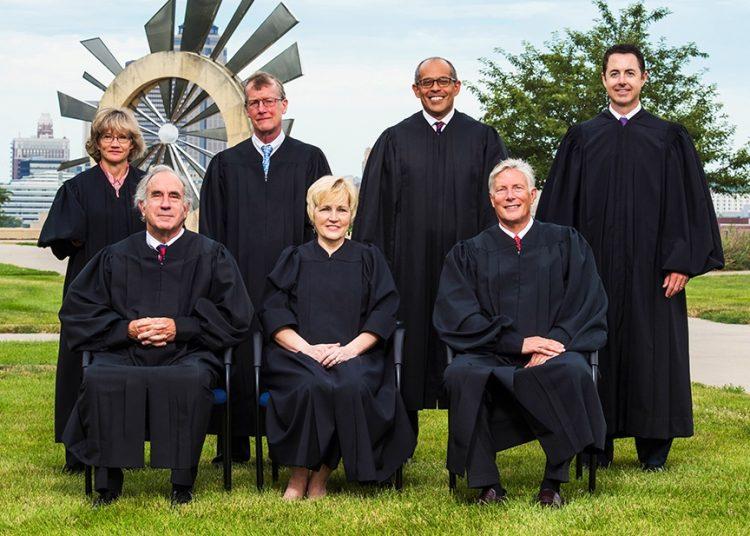DES MOINES, Iowa – The Iowa Supreme Court issued a ruling on Friday upholding the state’s 24-hour waiting period for an abortion. It also overturned its 2018 Planned Parenthood v. Reynolds decision finding abortion to be a fundamental right in Iowa’s Constitution.
The justices decided five to two, with Chief Justice Susan Christensen and Justice Brent Appel in dissent, to uphold the waiting period law and to overturn the 2018 decision. (Correction: We originally reported that Chief Justice Christensen joined the majority in upholding the 24-hour waiting period law, but dissented overturning the 2018 law .However, she only joined the majority rejecting single issue argument – see the opinion below – made by the plaintiffs, but in her separate opinion stated she found the law unconstitutional since she was unwilling to overturn the 2018 decision because of stare decisive. We regret the error.)
The case, Planned Parenthood v. Reynolds (PPH III, the 2018 case is PPH II), is remanded back to the district court.
Justice Edward Mansfield wrote the court’s opinion.
“Although we overrule (the 2018 decision) and thus reject the proposition that there is a fundamental right to an abortion in Iowa’s Constitution subjecting abortion regulation to strict scrutiny, we do not at this time decide what constitutional standard should replace it,” he wrote in the introduction.
Mansfield later wrote that the 2018 decision “lacks textual and historical support. It is doctrinally inconsistent with prior Iowa jurisprudence concerning family rights that followed a balancing approach. Its rhetoric is one-sided. Its constitutional footing is unsound.”
The Iowa Supreme Court also acknowledged the expected Supreme Court decision in Dobbs v. Jackson Women’s Center case that could overturn Roe v. Wade and Planned Parenthood v. Casey.
“(W)e are not blind to the fact that an important abortion case is now pending in the United States Supreme Court,” Mansfield wrote. “That case could alter the federal constitutional landscape established by Roe and Casey. While we zealously guard our ability to interpret the Iowa Constitution independently of the Supreme Court’s interpretations of the Federal Constitution, the opinion (or opinions) in that case may provide insights that we are currently lacking.”
Mansfield wrote that the status quo is the undue burden test provided in the 1992 Supreme Court decision in Planned Parenthood v. Casey. That standard was applied in the 2015 Planned Parenthood v. Iowa Board of Medicine ruling that struck down the Board’s telemedicine abortion ban.
He said for now that is the governing standard that the district court must use.
Justice Matthew McDermott disagreed that Casey’s undue burden test should be the court’s governing standard.
“I dissent from my colleagues’ remand directing the district court to apply an ‘undue burden’ standard, subject (apparently) to the standard being ‘litigated further’ by the parties. In my view, we should emphatically reject—not recycle—Casey’s moribund undue burden test and instead direct the district court to apply the rational basis test to the plaintiffs’ constitutional challenge,” he wrote in a separate opinion.
“The ‘inherently standardless nature’ of the undue burden test opens wide the gate for judges to inject their own policy preferences in deciding whether a particular restriction creates an undue burden to getting an abortion,” he added.
Christensen, who did not join the majority in overturning the court’s 2018 opinion, said she could not do so out of respect for stare decisis.
“I do not believe any special justification ‘over and above the [majority’s] belief ‘that the precedent was wrongly decided’ warrants such a swift departure from the court’s 2018 decision,” she wrote in a separate opinion.
Appel disagreed with upholding the 24-hour waiting period and overturning their 2018 decision. In his separate opinion, he said, “This jurisprudence of doubt will plainly impact many women and the men who support them.”
Governor Kim Reynolds applauded the ruling.
“Today’s ruling is a significant victory in our fight to protect the unborn. The Iowa Supreme Court reversed its earlier 2018 decision, which made Iowa the most abortion-friendly state in the country. Every life is sacred and should be protected, and as long as I’m governor that is exactly what I will do,” she said.
Iowa Senate Majority Leader Jack Whitver, R-Ankeny, said Friday’s ruling was a victory for the separation of powers.
“The Supreme Court’s decision on single subject strengthened the legislature’s independence and constitutionally protected powers to write the laws of this state,” he said. “Undoing a constitutional right manufactured simply by judicial fiat and solidifying the legislature’s independence is a remarkable display of judicial restraint.”
U.S. Rep. Randy Feenstra, R-Iowa, who served in the Iowa Senate until 2021, applauded the ruling.
“In Iowa, we are proud to stand for life. Today’s decision by the Iowa Supreme Court underscores our commitment to protecting innocent life in Iowa. As a father and a Christian, I am committed to working with my pro-life colleagues in Congress to enact the same pro-life policies that we have championed in Iowa at the federal level,” he said.
Planned Parenthood North Central States expressed disappointment in the ruling and reminded Iowans that abortion is still legal.
“I want to be very clear that abortion is still safe and legal in Iowa, even after today’s Court decision,” said Sarah Stoesz, president and CEO of Planned Parenthood North Central States. “We are deeply disappointed that the Iowa Supreme Court is abandoning women in spite of overwhelming support for abortion access.”
ACLU of Iowa Legal Director Rita Bettis Austen called the decision a “devastating and shocking reversal.”
“But abortion remains legal in Iowa and we will continue to fight to challenge the two-appointment, minimum 24-hour mandatory delay law under the undue burden standard that the Court declined to overrule today,” she said.
Read the opinion below:
210856_404B59267AF78















